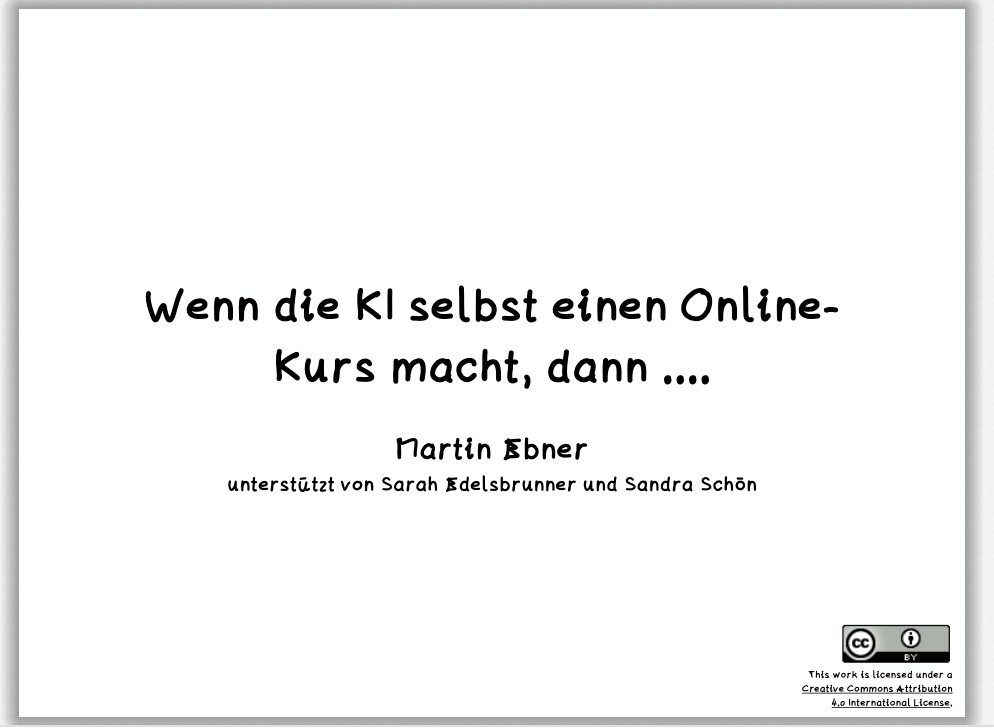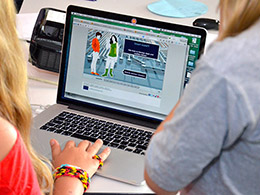Im Rahmen des ONLINE-Lesesymposium 2024: Lesen und Schreiben im Digitalen an der Pädagogischen Hochschule Kärnten, darf ich unsere Erfahrungen rund um KI und Online-Kurse schildern – hier gibt es meine Folien dazu:


Digitale Lehre an und rund um der Technischen Universität Graz
Es freut uns, dass wir nun den 18. Teil unserer Podcast-Serie „Lehren – Lernen – Lauschen“ auf der TELucation-Webseite zur Verfügung stellen können. Diesesmal spricht Isabel Landsiedler über Sprachenlehre:
In diesem Podcast spricht sie über ihre Lehre im Bereich Sprachen (Englisch, Spanisch) für Studierende und Teaching in English für Lehrende der TU Graz. Sie adressiert Unterschiede im Unterricht für die Zielgruppen Studierende und Lehrende, wie durch Maßnahmen wie betreute asynchrone Lehre die Studierbarkeit erhöht werden kann und plädiert für Selbstreflexion für Lehrende in der Nachbereitung ihrer Lehrveranstaltungen.
[#17 – Isabel Landsiedler: Sprachenlehre]
Und nicht übersehen – der Podcast ist auch in allen gängigen Portalen verfügbar:
We are very happy that we can announce our UNITE! course on Open Educational Resources (OER) for at least all partner universities but also beyond:
Dive into the realm of OER, where educational materials are openly accessible, editable, and shareable. Discover how to utilize OER ethically and effectively, and earn badges and credits for your accomplishments!
[press release @ UNITE!’s homepage]
[MOOC @ imoox.at for free access]
Our article about „Analysis of Learners‘ Emotions in E-Learning Environments Based on Cognitive Sciences“ got published in the International Journal of Interactive Mobile Technologies (iJIM):
Abstract:
The present study aimed to examine students’ emotions in e-learning classes through facial expressions and investigate the influence of different instructional methods on students’ emotional responses. In this study, we examined the facial expressions of 17 undergraduate students using three different methods of presenting educational content (PowerPoint, video, and Kahoot) in online classes and analyzed the data with face reader software. The findings demonstrated that students experienced various positive and negative emotions with different methods of content delivery. Furthermore, comparing the three methods revealed that the Kahoot method elicited the highest average of positive emotions among students compared to the other two methods. This difference can be attributed to the visual attractiveness and interactive nature of the Kahoot environment. Additionally, this study highlights that simply incorporating multimedia materials, such as PowerPoint presentations and videos, is not sufficient to enhance effectiveness and cultivate positive emotions in e-learning. While multimedia materials serve as supportive tools and enhance visualization, interaction at various levels (content, teacher, peers, etc.) is necessary. Nevertheless, the significance of this research lies in the innovative application of a tool for analyzing emotions in online learning classrooms, thereby enhancing the measurement of genuine and objective emotional responses in e-learning environments.
[full article @ journal’s homepage]
[full article @ ResearchGate]
Reference: Sahraie, F., Rezvanfar, A., Movahedmohammadi, S. H., Ebner, M., Alambeigi, A., & Farrokhnia, M. (2024). Analysis of Learners’ Emotions in E-Learning Environments Based on Cognitive Sciences. International Journal of Interactive Mobile Technologies (iJIM), 18(07), pp. 34–52. https://doi.org/10.3991/ijim.v18i07.48471
I am very happy that together with my colleagues we contribute to the newest issue of the „Zeitschrift für Hochschulentwicklung“ about Digital Skills. Therefore we present our latest results concerning the skills of our beginners at Graz University of Technology:
Digital skills are necessary for first-year students at Austrian universities. This paper unveils results from two surveys among first-year students at Graz University of Technology (TU Graz): Pre-Covid-19 data (n=921) is derived from a larger study on digital literacy among first-year students in Styria (Janschitz et al., 2021, N=4,676). The same questions were posed in the 2021 ‘Welcome Days’ survey after the Covid-19 distance learning phases (n=1,207). Surprisingly, the only significant change is a noticeable increase of skills concerning the digital signature. This article additionally presents the development of a lecture on digital skills that was implemented at TU Graz as a massive open online course (MOOC).
[full article @ journal’s homepage]
[full article @ ResearchGate]
Reference: Ebner, M., Mair, B., Nagler, W., Schön, S., & Edelsbrunner, S. (2024). Evolving Digital Skills of first-year students: A Pre- and Post-Covid Analysis. Zeitschrift für Hochschulentwicklung, 19(1), 45–65. https://doi.org/10.21240/zfhe/19-01/03
Regarding the topic of Open Educational Resources, there will be a new MOOC available on the platform iMooX.at starting from May 6, 2024. The free online course „OER in Higher Education“ by the European University Alliance „Unite!“ and other cooperating partners will be accessible in several languages, and the learning videos are created with the help of artificial intelligence. The avatars of the course instructors – me and Sandra Schön from TU Graz – will now speak in French, Italian, Indonesian, and other languages in the course videos of the four units.
Link to the MOOC – join us for free: https://imoox.at/course/OERinHE
Es freut mich sehr, dass ich zusammen mit meinen lieben und fleißigen Kolleg:innen eine Ausgabe der Zeitschrift für Hochschulentwicklung herausgeben durfte rund um das Thema „Digitale Kompetenzen„. Es gab eine hohe Anzahl an Einreichungen und leider konnten wir nur wenige davon berücksichtigen, diese sind aber nun alle offen und frei zugänglich.
Inhaltsverzeichnis:
Die gesamte Ausgabe findet man hier [.pdf] oder auf ResearchGate.
 Und schon sind wir in Woche 6 und damit leider auch schon beim Ende des MOOC zu „Lehren und Lernen mit digitalen Medien I“. Abschließend gibt es noch spannende Themen, vor allem im Bereich des Rechts, neben der DSGVO kommt auch noch das Thema OER zur Sprache.
Und schon sind wir in Woche 6 und damit leider auch schon beim Ende des MOOC zu „Lehren und Lernen mit digitalen Medien I“. Abschließend gibt es noch spannende Themen, vor allem im Bereich des Rechts, neben der DSGVO kommt auch noch das Thema OER zur Sprache.
Viel Spaß nochmals mit den Inhalten – hier das Video zur DSGVO und Privatsphäre:
Mitmachen ist natürlich jederzeit noch möglich, einfach hier anmelden: [Link zum Kurs]
 Und schon sind wir in Woche 5 beim MOOC zu „Lehren und Lernen mit digitalen Medien I„. Diese Woche geht es weiter mit einer Einführung in Bildungstechnologien und webbasierte Informationssysteme, über den Einsatz von Learning-Management-Systemen und um Kommunikation & Kollaboration.
Und schon sind wir in Woche 5 beim MOOC zu „Lehren und Lernen mit digitalen Medien I„. Diese Woche geht es weiter mit einer Einführung in Bildungstechnologien und webbasierte Informationssysteme, über den Einsatz von Learning-Management-Systemen und um Kommunikation & Kollaboration.
Viel Spaß mit den Inhalten – hier mein Video zu den webbasierten Informationssystemen für Lehren und Lernen:
Mitmachen ist natürlich jederzeit noch möglich, einfach hier anmelden: [Link zum Kurs]